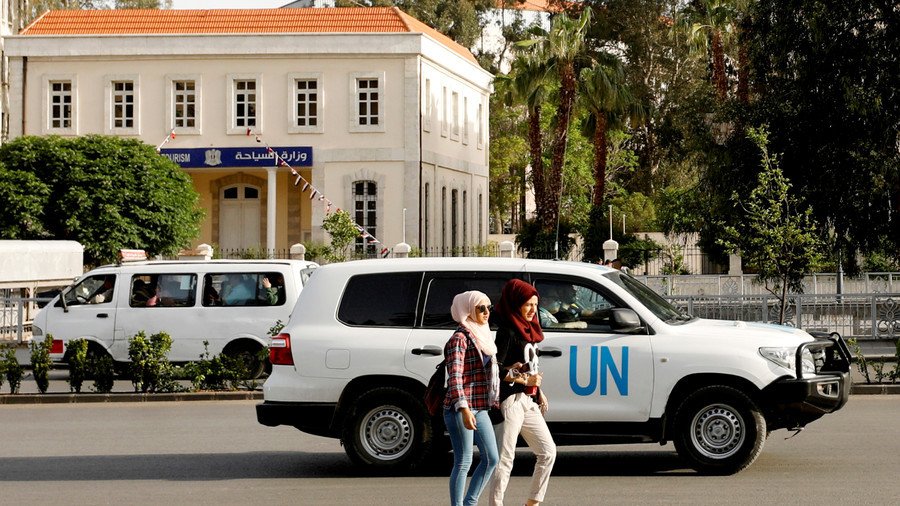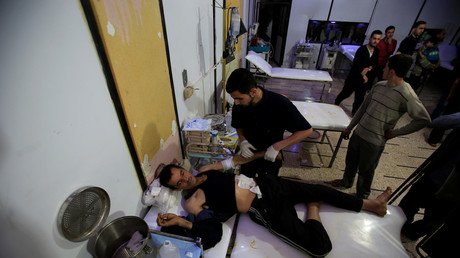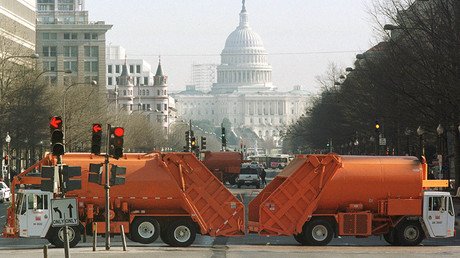'Should we wait around?' US defends premature Syria strike ahead of OPCW probe

The US, UK and France could not “wait around” for an independent probe into the alleged chemical attack in Douma, and decided to bomb Syria based on reports and intelligence that cannot be revealed, the US State Department said.
Asked why the three countries launched a strike on Syria last Friday, the night before a team of investigators from the Organization for the Prohibition of Chemical Weapons (OPCW) was due to visit the alleged attack site, State Department spokeswoman Heather Nauert said the US and its allies couldn’t wait for the results of the investigation.
“It can take quite a bit of time for the OPCW to gather its information and compile the report,” Nauert told reporters on Tuesday.
READ MORE: 5 things you should know about US-led 'one-time' strikes on Syria
“Should the US and our allies wait around for [Syrian President Bashar] Assad to use more chemical substances on his people? Should we wait for that formal investigation that can take months and months?” she continued, claiming that there have been nine chemical attacks since the start of 2018.
“We have our own intelligence” about what happened, Nauert added, arguing that the three countries have “excellent intelligence gathering” and did not take the decision to attack lightly.
“We have information that leads us to believe that both chlorine and sarin were used in the attack,” Nauert said, repeating the assertion made by the Trump administration on Friday. However, she declined to answer any specifics about the source of this information, claiming that doing so could endanger US sources on the ground.
AP’s Matt Lee pointed out that US intelligence had been “completely wrong” on Iraq’s weapons of mass destruction in 2003 and both the OPCW and the International Atomic Energy Agency (IAEA) had disagreed with such intelligence at the time.
#Douma ‘chemical attack’ was staged to provoke US strike against #Syria – Russian MoD https://t.co/0AqvQfz1Rk
— RT (@RT_com) April 13, 2018
Asked to clarify the comments made by the US representative at the OPCW, that Russian and Syrian personnel on site “may have” tampered with the evidence, Nauert simply read out the envoy’s statement without further explanation.
Pressured to reveal what might lead the US and UK to claim that Russia “may have” tampered with the evidence, Nauert once again cited intelligence information “that I am not permitted to get into here,” but argued that Assad’s responsibility for the attack was a fact and that Russia and Syria were trying to cover it up.
The Russian Foreign Ministry spokeswoman Maria Zakharova condemned the “unscrupulous disinformation campaign” from the West, saying that new safety arrangements for the OPCW mission had to be made in the wake of Friday’s missile attacks.
Zakharova also accused the UK government of being behind the “false reports” that the OPCW team had been barred from entering Douma so that Russia and Syria could tamper with the evidence. Those pushing such a narrative were willing to risk the OPCW investigators’ lives to promote their “dirty fake news,” Zakharova added.
At the time of the alleged attack, Douma was held by the Jaysh al-Islam (Army of Islam). The group surrendered and accepted evacuation with their families to the militant-held Idlib province on Monday. Russian specialists who examined the area found a laboratory stocked with chemicals and capable of producing two varieties of mustard gas.
The OPCW certified in 2013 that the Syrian government had turned over all its declared chemical stockpiles, noting that the two caches unaccounted for were in rebel-held territory. Nonetheless, Washington has continued to blame every alleged chemical incident on the government in Damascus.
If you like this story, share it with a friend!















